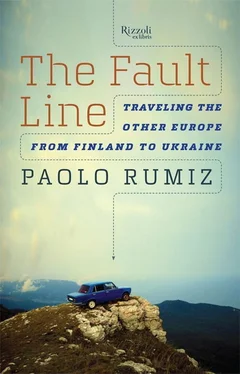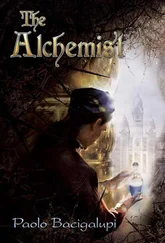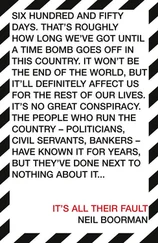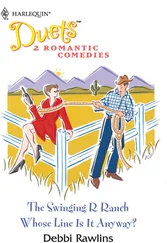I remain silent.
“We pulled out of Kabul, and now the British and the Americans are there making the same mistakes we did.”
“We Italians are there, too,” I tell him.
“You’re something different…. You don’t have a colonialist approach. Your Alpini left behind a good memory of themselves everywhere they went on the river Don.” He asks how we’re traveling in Russia.
I answer, “With a backpack, on buses and trains. Without reservations. Asking advice from the people.”
“You’re brave,” a woman who has overheard our conversation chimes in. “We Russians are full of bandits.”
Andrei: “But no, you’ll be fine. The majority are good people, like everywhere else, really.”
More lakes and woods, but the undulation of the terrain has become more nervous. We’re entering Karelia, with its thousand lakes between Russia and Finland. A gray house with POLYARNY KRUG written on the side indicates the passage of the Arctic Circle. Our train is running on the right track, the normal left track is occupied by a convoy of woodsmen who are clearing a sixty-foot swath on either side of the line. Now the metamorphosis of the landscape has accelerated. The prairies are strewn with erratic boulders. The spaces expand, the meridians widen more decisively, the light is yellower, the taiga (forest) greener, the trees more robust.
The station names have more vowels. Knyazhaya Guba, Knäsö, Poyakonda. At Loukhi, three young anglers come onboard. They come from Kalevala, and that name, as soon as it’s pronounced, resounds like a rifle shot through the compartment. Kalevala!—the land of the epic of Väinämöinen, the Iliad of the North, the legend of the boatbuilder bard. Now the train is navigating between swollen blue rivers, all flowing southeast. Anton, a young angler who has been to Italy, tells me that Kalevala is a good place to live. “There aren’t any new Russians or busloads of Western tourists who have soaked up all the fishing licenses on the Kola Peninsula. The roads are terrible, and the rivers are the best way to get around. A wilderness paradise.”
Where am I? In Europe or out of Europe? What are the boundaries of my world? The river Don? The Urals? The river Bug? Or this pogranichnaya zona (border zone) with barbed-wire fences and guard towers that runs alongside the train? And what if Europe were nothing but an unreachable mirage, as Witold Gombrowicz said, for those from the East who go looking for it? Or what if it were a slow becoming, a progressive thickening of ethnic groups toward the land of the sunset, beyond which lies nothing but the endless ocean? The Arctic peoples I have just encountered on the Kola Peninsula—are they or are they not European? And what about Karelia, where does it belong? To be sure, my world does not correspond to the conglomerate of banks that is the EU, nor to Catholic-Protestant civilization. People say that Christ is the symbol of the West. Why not Zeus then? And does Bethlehem, which is in the Middle East, belong to some anti-Christian world?
I’m actually not on a frontier at all, but in the middle territories, where millions of people have been torn away from their homes, and regimes have left heaps of ruins. But I’m also in the lands where, as Monika says, the gods talk to one another. Where Christianity is infused with the shamanic magic of the North, where the faithful prostrate themselves as though they were Muslims, and rabbis have cohabited for centuries with the onion-domed bell tower. I look around me at this train full of young people and children, and I think that maybe the real sign of where I come from is senility, the white beard with which I stubbornly insist on traveling like a kid. Here in the lands of the Sarmatians, the Slavs, the Finno-Ugrics, of the Parthians and Dacians, I feel that I belong to a world that is falling apart, drowning in perfect unconsciousness. Like the Roman Empire.
Some brutish policemen come aboard wearing camouflage uniforms. They stride through the car with the conductor, looking for something. In a compartment near ours, there is a young man dressed in black, tattoo, boxer’s nose, short hair, big hands and red knuckles, his eyes hard and tender at the same time. He doesn’t sit down; he’s tense, restless. He torments a set of rosary beads in black wood and looks insistently at Monika and her cameras.
She gets over her embarrassment and takes him by the hand. She makes him sit down, asks him why he looks so serious.
He says, right out, “I just got out of jail. Two years.”
“Are you going home now?”
“Yes, but I don’t know what’s waiting for me when I get there.” It’s clear he’s afraid of something, or someone.
“Do you have a family?”
“My parents abandoned me when I was three.” He holds his hand at knee level to show how tall he was. “I spent ten years in an orphanage.”
In Russia, everyone knows that orphanages are the ideal place for criminal recruitment.
“Have you got a girlfriend?”
“Yeah, a girl from Belarus. She wrote to me in jail. But I’ve never met her.” He shows me a letter, then a picture. “Pretty, eh?”
He sighs and looks out the window into the woods. “Now it’s full of blueberries and strawberries. Soon it’ll be mushroom season.”
“You like the woods?”
His yes is a crisp nod of the head, like an act of submission. Then he takes his rosary and puts it in Monika’s hand. “This is yours,” he says. Then he looks at me, standing there in silence. I ask him if he made the rosary himself.
“Yeah, I made it, but not for punishment. The priest told a lot of people to make rosaries as penance. But I didn’t trust that guy. He used to be in the KGB. I made my rosary because I wanted to.”
I take it from Monika’s hand. Black, solid, with fifty beads and six crosses. I tell him it’s a splendid gift, that we’ll keep it forever. I rummage through my jacket and offer him the only thing I have to give him. A Swiss Army knife.
“Here, my friend, this is our gift to you. But first you have to give me a kopek. Otherwise it will bring you bad luck.”
He digs the copper coin out of his pocket and holds it out to me. I tell him about my kids, gone far away from home to find work, and his eyes tear up again. Every time I tell him something that goes straight to the heart, he turns his head so we won’t see that’s he’s upset. I look at him closely. His eyes are far apart, of a rare deep green, with golden sparkles. His smile is embarrassingly sweet. I notice his strong neck and ask him if he has ever boxed.
“Yeah, but I was a chump.”
I tell him my father was excellent. Lean and agile, he could knock me down with only the slightest movement of his body. His eyes tear up again.
The train is pulling into the station at Kyem, jumping-off point for the Solovetsky Islands. We’re getting off here. We say good-bye. “Do me a favor now and keep out of trouble.” We give him our address and phone number. He writes down his for us. Alexander etc. I see that he lives in a village nestled among the great lakes. A land of enchantment, which, however, terrorizes him.
Now the train is stopped in the rain. From platform number two, I look back at a young man dressed in black, looking out from behind the window, pretending not to cry.
“Maybe we’ll meet again,” Monika calls out to him.
He smiles: “Well, the world is round, isn’t it?”
We cross the tracks of platform one, our legs turned to mush from sadness, our black rosary in hand. Alexander. We’ll carry in our hearts forever the gaze of this orphan with the tender heart, stranded on a troubled road.
Looking at it from the wharf, the ferryboat for the Solovetskys—the monastery islands turned Gulag—looks as though it’s suspended like a hot air balloon.
Читать дальше












